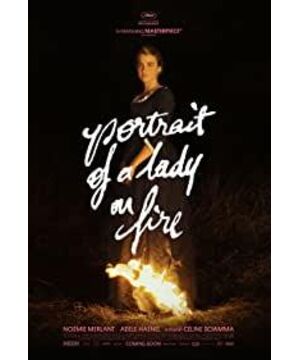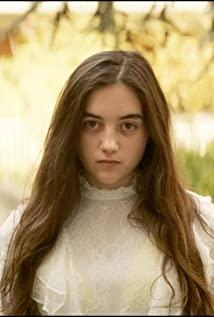Fire is a natural element that is revered, worshipped, and given special meaning by almost all human civilizations. In the Greek mythology mentioned in the movie, Prometheus created human beings, but when his brother created animals, he gave them all his talents, so human beings can only hide from the pursuit of animals, and shiver without fur at night. Prometheus sympathized with the world and wanted to bring fire to human beings, but Zeus believed that fire was a holy thing and could only be enjoyed by gods. Prometheus had to hide the fire of Mount Olympus in a cumin pole and bring it to the world. Looking at the rising smoke, the human mind seems to drift towards Mount Olympus with it.
Taking the movie timeline as a reference,
The first fire appears:
In the studio, the students brought out the teacher's drawing. The teacher, Marianne, said that it was drawn a long time ago, called Portrait of a Burning Woman.
We can perceive that this is a very powerful painting, and it must have a memorable story.
The second fire appears:
Marianne took off her clothes and sat on the floor by the fireplace to make a fire on her first night on the island. In the dimly lit room, the fire burned behind her, sketching her silhouette, outline, born lines, like a work of art. At that time, she was only thinking of making a portrait for the daughter of the hostess, how could she have thought of the story behind it.
The third fire appears:
At this time, Marianne had finished her first painting for Héloïse. She knew that she did not paint Héloïse's expression, but she was still angry after being judged by Héloïse, and wiped the face on the painting. Are you arguing about the painting, or are you blaming the other for not taking that step of understanding each other?
That night, Marianne looked at the portrait with the light of a candle, then lit her on the portrait's chest. This scene touched my heart. I knew then that, in the days to come, she would really ignite a fire in Héloïse's heart and become the love of her life.
The fourth fire appears:
Probably the most heartwarming scene of the movie. Marianne and Héloïse confirm their love for each other as they smile at each other through the bonfire amid the undulating acapella singing. The flame at this time is like the heart of the two people at this time, and the hot light illuminates the night of the lonely island.
ADDED: Accapella is medieval church music, and the medieval church was ultra-conservative - homosexuality was punished, reflecting in some ways the worldly resistance of love between two people. And the name of this acapella is called fugere non possum (Latin), which means 'they come fly,' The lyricist's interpretation of this is adapted from a sentence by Nietzsche. The original sentence is to the effect that in those To those who can't fly, the higher we fly, the smaller we look. [ It's an adaptation of a sentence by [Friedrich] Nietzsche, who says basically, 'The higher we soar, the smaller we appear to those who cannot fly.'] I think, the two do want to fly off this island, away from the mundane All kinds of resistance, stay away from people who can't fly, love and accompany each other.
View more about Portrait of a Lady on Fire reviews











